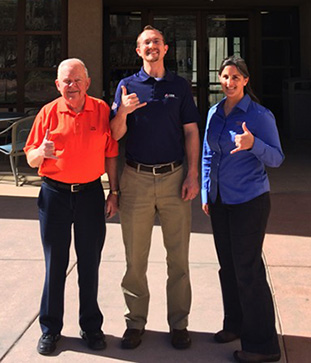Originally published April 3, 2015
By Nadia M. Whitehead
UTEP News Service
This has been a whirlwind year for Malynda Cappelle.
Twelve months ago, she and a group of University engineers made up one of more than 60 teams from 29 countries registered for the worldwide Desal Prize challenge. Today, The University of Texas at El Paso team is one of five competitors left standing.

“We’re in this with some top-notch contestants,” said Cappelle, who leads the UTEP team. “We are up against individuals from MIT, a conglomerate of the Asian Institute of Technology, and several small businesses and companies.”
Along with a crew of volunteer engineering students, Cappelle and teammates Tom Davis, Ph.D., and Shane Walker, Ph.D., are working to prepare for the competition kickoff on April 6. That day, finalists are expected to have their desalination prototypes in the desert city of Alamogordo, New Mexico; the weeklong competition will take place at the Brackish Groundwater National Desalination Research Facility (BGNDRF).
The Desal Prize competition was organized to encourage and accelerate innovative solutions to treat brackish water — water that is saltier than freshwater, but less salty than seawater. Qualifying teams from across the globe and their cutting-edge desalination technologies are pitted against each other to see who can create a cost-effective, environmentally sustainable system that’s suitable for treating brackish water in remote settings where water is scarce.
“There’s very little freshwater in the world,” said Davis, the director of the Center for Inland Desalination Systems at UTEP. “About 98 percent of the water on our planet is salty, so being able to recover freshwater from salty water is going to be very important as our population grows and needs more of it. We also need freshwater to irrigate our crops, so desalination is one way to meet this demand.”
Davis is the inventor of the technology that will be used by the UTEP team. Dubbed Zero Discharge Desalination (ZDD), the system will be housed within a small trailer and powered by multiple solar panels. The technology is expected to have at least a 93 percent recovery rate at BGNDRF, meaning 93 percent of the brackish water that goes through the system will wind up drinkable or usable for irrigation.
What’s truly unique is that the ZDD system also produces a solid product from the leftover brackish wastewater. Primarily composed of calcium and magnesium salts, the product could be used by farmers to improve their land’s soil conditions for more efficient irrigation and crop yield.
Graduate civil engineering student Osvaldo Broesicke, who is helping the team prepare for the competition, said he never expected to work on such a project at UTEP.
“I think it’s really great that UTEP is participating in this competition,” Broesicke said. “It’s getting a lot harder to find freshwater resources and something we can actually drink. Desalination needs to become more efficient, consume less energy and become more available for everyone.”
That’s exactly the Desal Prize’s goal.
The top three winners of the challenge will receive cash prizes ranging from $25,000 to $125,000. Those same teams will be invited to develop grant proposals to pilot their systems in a developing country of their choice. Up to $400,000 in total will be available to support the pilot projects.
“If we’re one of the winners, I’m hoping to take this technology to Mexico,” Cappelle said. “The country is just south of us and we could really assist farmers who don’t have access to usable water with this technology.”
Cappelle envisions the technology also could make it to Africa one day, a country that faces stark water scarcity issues. Since ZDD is powered by sunlight, anyone could have access to drinkable water on sunny days.
The Desal Prize is sponsored by the U.S. Agency for International Development (USAID), the U.S. Bureau of Reclamation, the Swedish International Development Agency and the Ministry of Foreign Affairs of the Kingdom of The Netherlands.